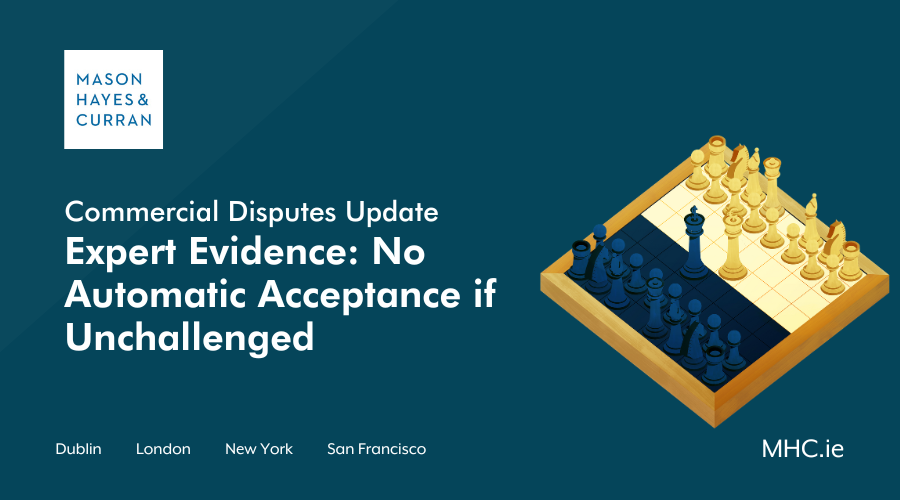Expert Evidence: No Automatic Acceptance if Unchallenged

The Court of Appeal has recently confirmed that even if an expert’s evidence is not contested by the other side that does not mean that it will be automatically accepted by a court. A court is still entitled to consider the expert’s evidence and is not obliged to accept it. Gearoid Carey and Gerard Kelly, Commercial Disputes partners, examine the decision.
The Court of Appeal recently determined an appeal relating to the treatment by the High Court of an affidavit sworn by an expert.[1]
The expert’s evidence was not opposed or contradicted by the other party to the proceedings. The Court of Appeal held that, even though it was not challenged, the Court had no obligation to accept the evidence unquestioningly. Rather, it was entitled to consider the extent of the expert’s expertise and the basis on which they had been asked to prepare their report. The decision highlights that, in order to maximise the prospect of the expert evidence being accepted, those instructing experts should take care when instructing them and in putting their evidence before the court.
Background
The case here arose out of the use of lands which the respondent rented from the applicant. The respondent, which operates shipping container depots, had established a depot on the land involved. However, although this use was permitted by the lease, the respondent had not secured planning permission. The council, as the relevant planning authority, served an enforcement notice on both the landlord and tenant. The applicant landlord then brought proceedings against the tenant respondent under Section 160 of the Planning and Development Act 2000 (as amended). That section empowers the court to make orders regarding the cessation of unauthorised developments and the order sought was granted in the High Court. Although a limited stay was granted to allow operations to be wound down, the respondent applied for a longer stay to allow it to put alternative arrangements in place. The hearing of that application was deferred for several weeks to allow further affidavits to be filed but was ultimately refused.[2] That refusal was appealed to the Court of Appeal.
The respondent’s position
The respondent’s appeal was essentially founded on the argument that there was a public interest in allowing the continued use of the site for its business. This arose from a shortage of container storage space. As a consequence, the costs and delays if customers had to look further afield for suitable facilities could present problems for the Irish economy generally. As part of its case for an extended stay, the respondent had relied on various experts. In the appeal, it claimed, amongst other things, that the trial judge attached insufficient weight to the fact that the applicant did not oppose the request for an extended stay. Further, the respondent argued that the trial judge was wrong to reject the uncontested affidavit evidence of its economic expert in particular and did not afford him a fair opportunity to address his concerns before rejecting the evidence.
Decision
Ms Justice Butler for the Court of Appeal noted that the evidence in issue was primarily that of the respondent’s economic expert. She noted that the trial judge had no concern regarding the personal credibility of the expert, a well-respected and highly qualified economist. Rather, the trial judge’s concern related to the basis on which the expert was instructed. This was because:
- The respondent had not presented any independent evidence of the claimed public interest prior to the date fixed for the hearing, and
- The expert’s report was produced in six days.
It was also clear from the report that the expert’s views were based on the circumstances and data provided by the respondent. Ms Justice Butler noted that phrases like “per company supplied information”, “based on company reports” and “per company” appeared frequently. This prompted her to observe that it was “unsurprising” that the trial judge flagged his concerns by directing that the expert swear an affidavit to exhibit the briefing materials provided to him.
It was also noted that the report omitted certain explanations and analyses, which appeared implicitly relevant, and there were discrepancies between the report and publicly available sources which it cited by way of hyperlinks. The Court of Appeal rejected the assertion that in accessing those sources the trial judge engaged in independent research – “if material is hyper-linked in an expert’s report, then it constitutes part of the reference material on which the report is based and a court is, at the very least, entitled (if not expected) to look at it where it has concerns regarding the content of the report itself.”
The Court of Appeal observed that: “For a court to assess the appropriate weight to afford to an expert opinion, it is necessary to establish both the extent of the expert’s expertise and the basis upon which they have been asked (usually by one of the parties to the case) to prepare their report. The former, as I have noted, does not arise in this case but the latter does.” Ms Justice Butler went on to note, citing prior cases,[3] that “Even where an appropriately qualified expert properly instructed gives evidence, a court is not obliged to accept that evidence” and that “The expert is there to assist the court, not to decide the case and the court has no obligation to accept the evidence of any particular expert, even where it is uncontradicted.”
In concluding that the trial judge was entitled to interrogate the evidence, the Court of Appeal noted that the public interest argument was only introduced in an affidavit sworn on the day the stay application was originally to be heard. In addition, the expert was only instructed on that same day and, in producing his report five days later, “quite clearly did not purport to have done independent research within that time frame to confirm the underlying facts upon which he had been instructed.”
Conclusion
The decision confirms that the court is not obliged to accept expert evidence merely because it is not contradicted by any party. Rather, it is entitled to interrogate the evidence given, including by reference to the instructions given the expert and the materials referenced by the expert. This is not necessarily inconsistent with the UK Supreme Court’s position[4] that a court should only disregard uncontroverted expert evidence in exceptional circumstances, including where the opinion is not supported by reasoning, as was apparently part of the criticism here. This is important to bear in mind by any party seeking to rely on expert evidence, especially where it is uncontradicted.
However, there are steps that can be taken to minimise the possibility that a court may disregard uncontested expert evidence, even where the relevant individual is undoubtedly an expert, by ensuring no exceptional circumstance arises. Early identification and presentation of the legal principles which the expert evidence will support is important, as is ensuring that the evidence of witnesses of fact support them. Instructing the expert in ample time to allow them to undertake independent research to verify their instructions and materials furnished and to properly reason their evidence and conclusions is also crucial. Express reliance in the report/affidavit to information or instructions provided by the instructing party is to be avoided where possible. Finally, should the court voice concerns about the evidence presented or require clarifications, these should be addressed quickly and comprehensively.
For more information and expert advice on commercial disputes, contact a member of our Commercial Disputes team.
The content of this article is provided for information purposes only and does not constitute legal or other advice.
[1] Tesco Ireland Limited v Stateline Transport Limited [2024] IECA 46
[2] [2023] IEHC 587
[3] Duffy v McGee [2022] IECA 254; Donegal Investment Group v Danbywiske [2017] IESC 14
[4] TUI UK Ltd v Griffiths [2023] UKSC 48 which we considered at https://www.mhc.ie/latest/insi...
Share this:

Gerard Kelly SC
Partner, Head of Intellectual Property Law, Co-Head of Dispute Resolution
+353 86 820 8066 gkelly@mhc.ie

